-
 Bitcoin
Bitcoin $82,480.7409
-0.17% -
 Ethereum
Ethereum $1,761.8148
-1.29% -
 Tether USDt
Tether USDt $0.9992
-0.03% -
 XRP
XRP $2.0760
-2.34% -
 BNB
BNB $580.1097
-2.07% -
 USDC
USDC $0.9996
-0.04% -
 Solana
Solana $114.9273
-2.16% -
 Dogecoin
Dogecoin $0.1617
-3.26% -
 TRON
TRON $0.2394
0.23% -
 Cardano
Cardano $0.6249
-3.65% -
 UNUS SED LEO
UNUS SED LEO $9.0482
0.82% -
 Toncoin
Toncoin $3.3046
2.09% -
 Chainlink
Chainlink $12.2251
-3.18% -
 Stellar
Stellar $0.2510
-0.53% -
 Avalanche
Avalanche $17.1136
-4.11% -
 Shiba Inu
Shiba Inu $0.0...01188
-1.90% -
 Sui
Sui $2.0890
-4.58% -
 Hedera
Hedera $0.1546
-3.19% -
 Polkadot
Polkadot $3.8856
-0.65% -
 MANTRA
MANTRA $6.1711
-1.42% -
 Litecoin
Litecoin $78.7845
-4.33% -
 Bitcoin Cash
Bitcoin Cash $293.9171
-1.27% -
 Dai
Dai $1.0000
-0.02% -
 Bitget Token
Bitget Token $4.3417
-2.11% -
 Ethena USDe
Ethena USDe $0.9989
-0.01% -
 Pi
Pi $0.6205
-3.81% -
 Monero
Monero $211.2979
-2.19% -
 Hyperliquid
Hyperliquid $11.3176
-1.41% -
 Uniswap
Uniswap $5.6110
-3.44% -
 OKB
OKB $53.7230
6.42%
How does NFT Legal Frameworks regulate the ownership and trading of NFTs?
NFT ownership and trading are governed by a complex interplay of contract, intellectual property, and property law, with significant jurisdictional variations and ongoing debates regarding smart contract enforceability and secondary market royalties.
Mar 04, 2025 at 07:25 pm
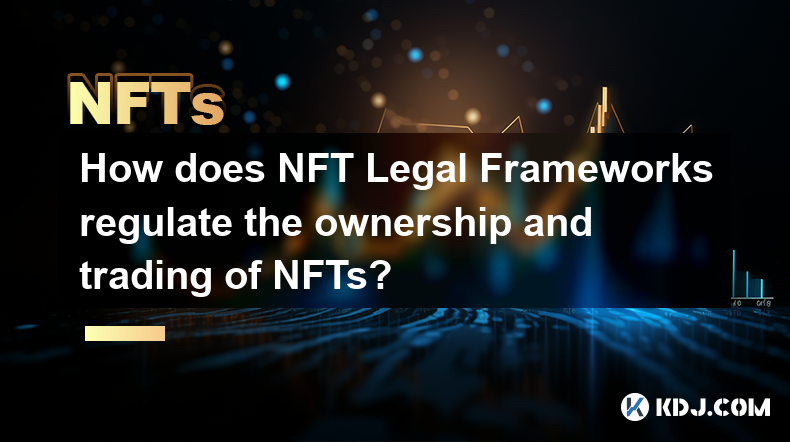
Key Points:
- NFT legal frameworks are still nascent and vary significantly across jurisdictions.
- Ownership and trading are governed by a complex interplay of contract, intellectual property, and property law.
- Issues surrounding intellectual property rights, secondary sales royalties, and fraud are central to the regulatory challenges.
- Many jurisdictions are still developing specific legislation to address NFTs, relying on existing legal structures for guidance.
- International harmonization of NFT legal frameworks is crucial for the long-term growth and stability of the NFT market.
How does NFT Legal Frameworks regulate the ownership and trading of NFTs?
The legal landscape surrounding Non-Fungible Tokens (NFTs) is rapidly evolving, yet remains largely undefined in many jurisdictions. Currently, there isn't a universally accepted legal framework governing NFT ownership and trading. Instead, the regulation draws upon existing legal principles, primarily contract law, intellectual property law, and property law. This patchwork approach creates both opportunities and significant challenges for NFT creators, buyers, and traders.
Ownership:
The question of NFT ownership is central. While an NFT grants the owner a verifiable record of ownership on a blockchain, this doesn't automatically equate to ownership of the underlying asset. For example, owning an NFT representing a digital artwork doesn't automatically grant exclusive copyright to that artwork. The copyright remains with the creator unless explicitly transferred through a separate agreement. This distinction is crucial. Legal frameworks often address this through contracts specifying the rights granted with the NFT sale. These contracts may include provisions for use, display, and even secondary market royalties.
Trading:
NFT trading takes place on various platforms, often decentralized marketplaces. The legal framework governing these transactions is complex. Contract law governs the agreement between buyer and seller, determining the terms of the sale, including price, payment methods, and any associated intellectual property rights. These contracts are typically enforced based on the jurisdiction where the contract was formed or where the parties involved reside. Smart contracts, self-executing contracts encoded on a blockchain, play a significant role in automating NFT transactions. However, their legal enforceability is still an area of ongoing debate and legal interpretation.
Intellectual Property Rights:
Intellectual property rights are a significant component of NFT legal frameworks. An NFT may represent ownership of a digital artwork, music, or other intellectual property. However, the NFT itself doesn't automatically transfer all associated intellectual property rights. Copyright, trademark, and other intellectual property laws still apply. The creator retains these rights unless explicitly assigned to the NFT owner through a clear and legally sound contract. This lack of clarity often leads to disputes over usage rights and potential infringement.
Secondary Market Royalties:
Many NFT creators utilize smart contracts to implement royalty mechanisms, automatically collecting a percentage of each secondary sale of their NFT. The legal enforceability of these royalties varies depending on jurisdiction and contract design. Some jurisdictions are more receptive to enforcing these provisions, while others may consider them unenforceable if not explicitly addressed in separate legal agreements. This discrepancy highlights the need for clear and consistent legal frameworks for handling secondary market royalties.
Fraud and Scams:
The decentralized nature of the NFT market presents opportunities for fraudulent activities, including scams and counterfeiting. Legal frameworks are attempting to address these issues through various means. Consumer protection laws may provide recourse for victims of NFT scams, though enforcement can be challenging given the often international nature of NFT transactions and the complexities of tracing assets on blockchains.
Jurisdictional Differences:
NFT legal frameworks differ significantly across jurisdictions. Some countries are actively developing specific NFT regulations, while others rely on existing laws. This inconsistency creates uncertainty and makes it challenging for NFT creators and traders to operate across borders. The lack of harmonization poses a major obstacle to the broader adoption and growth of the NFT market.
Future Developments:
The legal landscape surrounding NFTs is constantly evolving. Governments and regulatory bodies worldwide are grappling with the challenges of regulating this rapidly growing market. The development of clear and consistent legal frameworks is crucial for ensuring the long-term stability and sustainability of the NFT ecosystem. International cooperation and harmonization of legal approaches will be essential for fostering a globally interconnected NFT market.
Common Questions and Answers:
Q: Does owning an NFT give me full ownership of the underlying asset?
A: Not necessarily. Owning an NFT grants you ownership of the NFT itself, a unique digital token on a blockchain. However, it may not automatically grant you all rights associated with the underlying asset (e.g., copyright of an image). This depends on the terms specified in the sale agreement and the intellectual property rights associated with the asset.
Q: Can I be sued for copyright infringement if I own an NFT of copyrighted material?
A: Yes, potentially. Owning an NFT doesn't automatically grant you the right to use, reproduce, or distribute copyrighted material associated with it. Copyright infringement lawsuits remain possible if the terms of the NFT sale or underlying intellectual property rights are not properly addressed.
Q: Are smart contracts legally binding?
A: The legal enforceability of smart contracts varies depending on jurisdiction and the specific terms of the contract. While they offer automation and transparency, their legal standing is still being actively clarified in many legal systems. They are typically considered legally binding contracts under contract law, but their enforceability may depend on the jurisdiction where the parties involved reside.
Q: What happens if I am scammed when buying an NFT?
A: Depending on the nature of the scam and the jurisdiction, you may have legal recourse. Consumer protection laws might apply, but tracing the perpetrators and recovering assets can be challenging due to the decentralized nature of the NFT market. Reporting the scam to relevant authorities and documenting the transaction is crucial.
Q: How are secondary market royalties enforced?
A: Enforcement of secondary market royalties varies by jurisdiction and contract design. Smart contracts can automate the collection of royalties, but their legal enforceability is still evolving. Some jurisdictions may actively enforce these royalties, while others might require explicit legal agreements beyond the smart contract for enforcement.
Disclaimer:info@kdj.com
The information provided is not trading advice. kdj.com does not assume any responsibility for any investments made based on the information provided in this article. Cryptocurrencies are highly volatile and it is highly recommended that you invest with caution after thorough research!
If you believe that the content used on this website infringes your copyright, please contact us immediately (info@kdj.com) and we will delete it promptly.
- Dogecoin (DOGE) Prepares for a Potential Breakout From Its Range-Bound Trading
- 2025-04-07 00:20:12
- Oh Whale Enters the Crypto Space with a Mission-Focused Approach
- 2025-04-07 00:20:12
- Development Activity on Ethereum Leads but Sees a Decline
- 2025-04-07 00:15:12
- The Pepe price dropped 2% in the last 24 hours to trade at $0.000007049
- 2025-04-07 00:15:12
- Next-Gen Meme Coin Panshibi (SHIBI) Presale Event Promises Over 145,000% Growth at Launch
- 2025-04-07 00:10:13
- JetBolt (JBOLT) Makes Waves in the Crypto Landscape, Smashing $3.2M in Presale
- 2025-04-07 00:10:13
Related knowledge
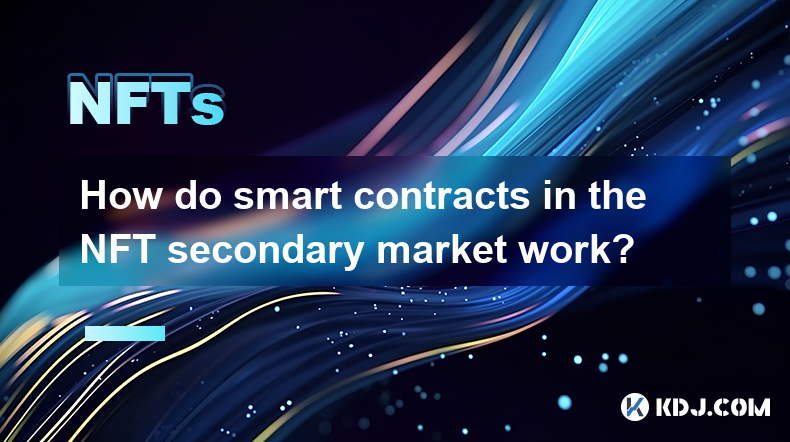
How do smart contracts in the NFT secondary market work?
Apr 03,2025 at 07:14am
Smart contracts play a pivotal role in the NFT secondary market, facilitating seamless transactions and enforcing predefined rules. These self-executing contracts with the terms of the agreement directly written into code are stored on the blockchain. In the context of NFTs, smart contracts automate the buying, selling, and transferring of digital asset...
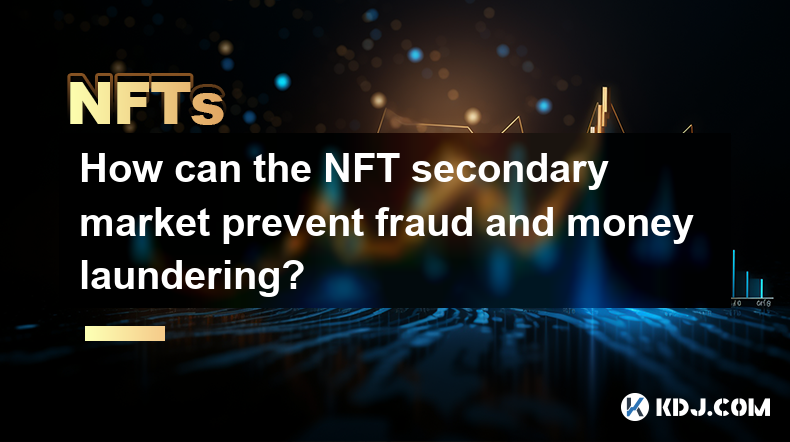
How can the NFT secondary market prevent fraud and money laundering?
Apr 03,2025 at 08:35am
The NFT secondary market has become a thriving hub for digital art and collectibles, but it also faces challenges in preventing fraud and money laundering. To tackle these issues, the market can implement various strategies and technologies to ensure a safer and more transparent trading environment. This article will explore how the NFT secondary market...
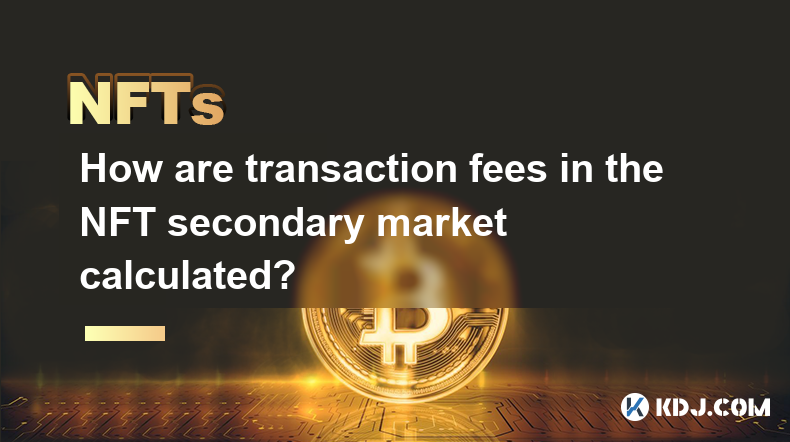
How are transaction fees in the NFT secondary market calculated?
Apr 04,2025 at 05:28am
The calculation of transaction fees in the NFT secondary market is a crucial aspect that both buyers and sellers need to understand. These fees can significantly impact the overall cost of transactions and the profits that sellers can make. In this article, we will delve into the various components that make up these fees, how they are calculated, and w...
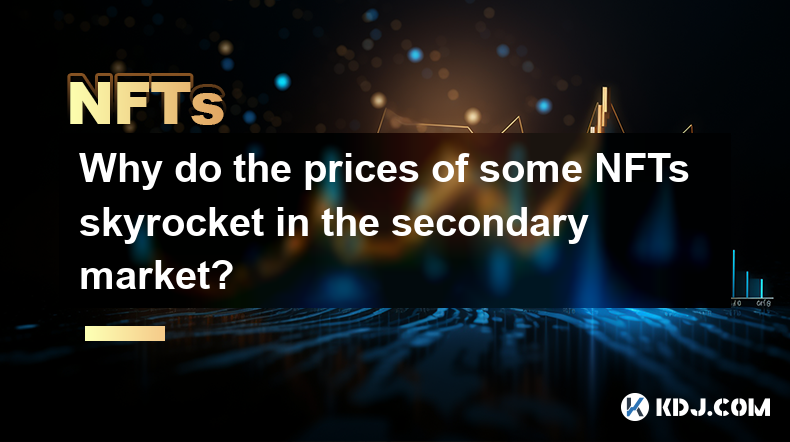
Why do the prices of some NFTs skyrocket in the secondary market?
Apr 06,2025 at 07:08am
The phenomenon of NFT prices skyrocketing in the secondary market is a fascinating aspect of the cryptocurrency and digital art world. Non-Fungible Tokens (NFTs) have taken the digital world by storm, and their value can surge dramatically after initial sales. Several factors contribute to this price surge, including rarity, demand, speculation, and the...
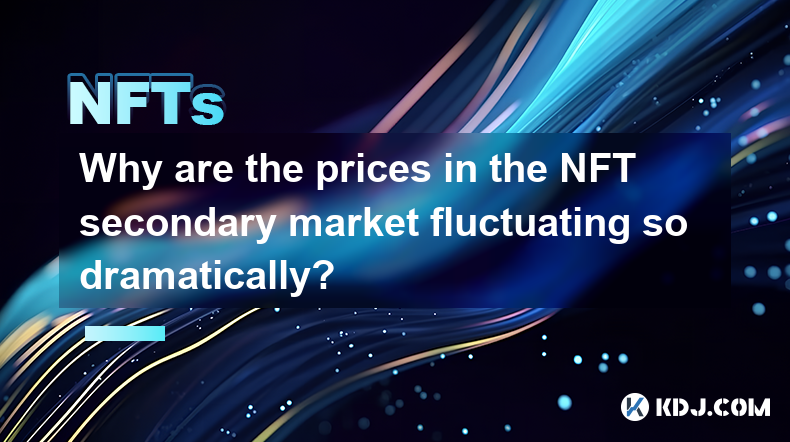
Why are the prices in the NFT secondary market fluctuating so dramatically?
Apr 03,2025 at 10:35pm
The NFT secondary market has been experiencing dramatic price fluctuations, leaving many in the cryptocurrency community puzzled and curious. To understand this phenomenon, it's essential to delve into the factors driving these price movements. From the impact of market sentiment and celebrity endorsements to the role of speculation and the unique natur...
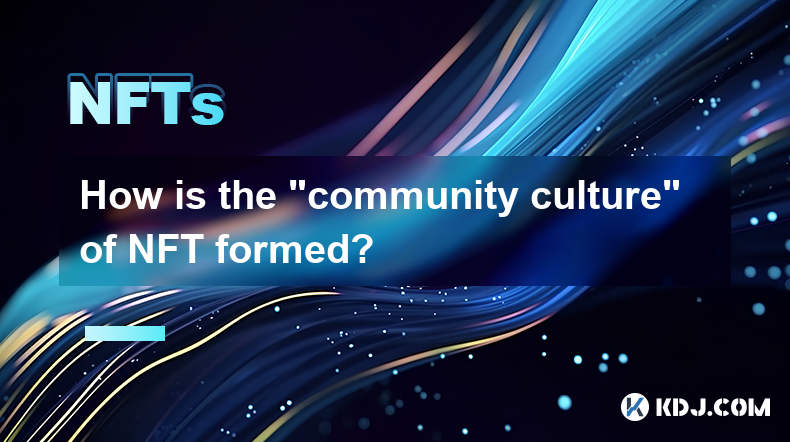
How is the “community culture” of NFT formed?
Apr 03,2025 at 11:07am
The formation of the 'community culture' within the NFT (Non-Fungible Token) space is a fascinating and multi-faceted process. It involves various elements such as shared interests, active engagement, and the creation of a sense of belonging among members. NFT communities often revolve around specific projects or artists, fostering a unique environment ...

How do smart contracts in the NFT secondary market work?
Apr 03,2025 at 07:14am
Smart contracts play a pivotal role in the NFT secondary market, facilitating seamless transactions and enforcing predefined rules. These self-executing contracts with the terms of the agreement directly written into code are stored on the blockchain. In the context of NFTs, smart contracts automate the buying, selling, and transferring of digital asset...

How can the NFT secondary market prevent fraud and money laundering?
Apr 03,2025 at 08:35am
The NFT secondary market has become a thriving hub for digital art and collectibles, but it also faces challenges in preventing fraud and money laundering. To tackle these issues, the market can implement various strategies and technologies to ensure a safer and more transparent trading environment. This article will explore how the NFT secondary market...

How are transaction fees in the NFT secondary market calculated?
Apr 04,2025 at 05:28am
The calculation of transaction fees in the NFT secondary market is a crucial aspect that both buyers and sellers need to understand. These fees can significantly impact the overall cost of transactions and the profits that sellers can make. In this article, we will delve into the various components that make up these fees, how they are calculated, and w...

Why do the prices of some NFTs skyrocket in the secondary market?
Apr 06,2025 at 07:08am
The phenomenon of NFT prices skyrocketing in the secondary market is a fascinating aspect of the cryptocurrency and digital art world. Non-Fungible Tokens (NFTs) have taken the digital world by storm, and their value can surge dramatically after initial sales. Several factors contribute to this price surge, including rarity, demand, speculation, and the...

Why are the prices in the NFT secondary market fluctuating so dramatically?
Apr 03,2025 at 10:35pm
The NFT secondary market has been experiencing dramatic price fluctuations, leaving many in the cryptocurrency community puzzled and curious. To understand this phenomenon, it's essential to delve into the factors driving these price movements. From the impact of market sentiment and celebrity endorsements to the role of speculation and the unique natur...

How is the “community culture” of NFT formed?
Apr 03,2025 at 11:07am
The formation of the 'community culture' within the NFT (Non-Fungible Token) space is a fascinating and multi-faceted process. It involves various elements such as shared interests, active engagement, and the creation of a sense of belonging among members. NFT communities often revolve around specific projects or artists, fostering a unique environment ...
See all articles





















































































